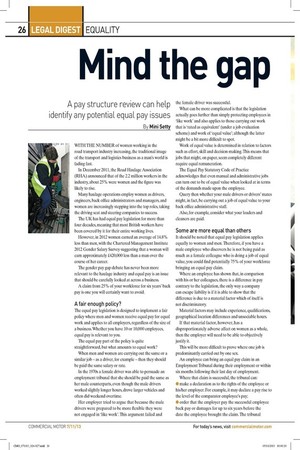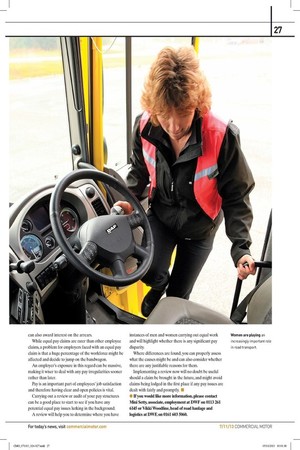Mind the gap
Page 20

Page 21

If you've noticed an error in this article please click here to report it so we can fix it.
A pay structure review can help identify any potential equal pay issues By Mini Setty
WITH THE NUMBER of women working in the road transport industry increasing, the traditional image of the transport and logistics business as a man's world is fading fast.
In December 2011, the Road Haulage Association (RHA) announced that of the 22 million workers in the industry, about 25% were women and the figure was likely to rise.
Many haulage operations employ women as drivers, engineers, back office administrators and managers, and women are increasingly stepping into the top roles, taking the driving seat and steering companies to success.
The UK has had equal pay legislation for more than four decades, meaning that most British workers have been covered by it for their entire working lives.
However, in 2012 women earned an average of 14.8% less than men, with the Chartered Management Institute 2012 Gender Salary Survey suggesting that a woman will earn approximately £420,000 less than a man over the course of her career.
The gender pay gap debate has never been more relevant to the haulage industry and equal pay is an issue that should be carefully looked at across a business.
A claim from 25% of your workforce for six years' back pay is one you will certainly want to avoid.
A fair enough policy?
The equal pay legislation is designed to implement a fair policy where men and women receive equal pay for equal work and applies to all employers, regardless of the size of a business. Whether you have 10 or 10,000 employees, equal pay is relevant to you.
The equal pay part of the policy is quite straightforward, but what amounts to equal work?
When men and women are carrying out the same or a similar job — as a driver, for example — then they should be paid the same salary or rate.
In the 1970s a female driver was able to persuade an employment tribunal that she should be paid the same as her male counterparts, even though the male drivers worked slightly longer hours, drove larger vehicles and often did weekend overtime. Her employer tried to argue that because the male drivers were prepared to be more flexible they were not engaged in `like work'. This argument failed and
the female driver was successful.
What can be more complicated is that the legislation actually goes further than simply protecting employees in 'like work' and also applies to those carrying out work that is 'rated as equivalent' (under a job evaluation scheme) and work of 'equal value'; although the latter might be a bit more difficult to spot.
Work of equal value is determined in relation to factors such as effort, skill and decision-making. This means that jobs that might, on paper, seem completely different require equal remuneration.
The Equal Pay Statutory Code of Practice acknowledges that even manual and administrative jobs can turn out to be of equal value when looked at in terms of the demands made upon the employee.
Query then whether your male drivers or drivers' mates might, in fact, be carrying out a job of equal value to your back office administrative staff.
Also, for example, consider what your loaders and cleaners are paid.
Some are more equal than others It should be noted that equal pay legislation applies equally to women and men. Therefore, if you have a male employee who discovers he is not being paid as much as a female colleague who is doing a job of equal value, you could find potentially 75% of your workforce bringing an equal pay claim.
Where an employee has shown that, in comparison with his or her colleagues, there is a difference in pay contrary to the legislation, the only way a company can escape liability is if it is able to show that the difference is due to a material factor which of itself is not discriminatory.
Material factors may include experience, qualifications, geographical location differences and unsociable hours.
If that material factor, however, has a disproportionately adverse affect on women as a whole, then the employer will need to be able to objectively justify it.
This will be more difficult to prove where one job is predominantly carried out by one sex.
An employee can bring an equal pay claim in an Employment Tribunal during their employment or within six months following their last day of employment. Where that claim is successful, the tribunal can: • make a declaration as to the rights of the employee or his/her employer. For example, it may declare a pay rise to the level of the comparator employee's pay; • order that the employer pay the successful employee back pay or damages for up to six years before the date the employee brought the claim. The tribunal
can also award interest on the arrears.
While equal pay claims are rarer than other employee claims, a problem for employers faced with an equal pay claim is that a huge percentage of the workforce might be affected and decide to jump on the bandwagon.
An employer's exposure in this regard can be massive, making it wiser to deal with any pay irregularities sooner rather than later.
Pay is an important part of employees' job satisfaction and therefore having clear and open policies is vital.
Carrying out a review or audit of your pay structures can be a good place to start to see if you have any potential equal pay issues lurking in the background. A review will help you to determine where you have
instances of men and women carrying out equal work and will highlight whether there is any significant pay disparity.
Where differences are found, you can properly assess what the causes might be and can also consider whether there are any justifiable reasons for them. Implementing a review now will no doubt be useful should a claim be brought in the future, and might avoid claims being lodged in the first place if any pay issues are dealt with fairly and promptly. •
• If you would like more information, please contact Mini Setty, associate, employment at DVVF on 0113 261 6145 or Vikki Woodfine, head of road haulage and logistics at DWF, on 0161 603 5060.








































